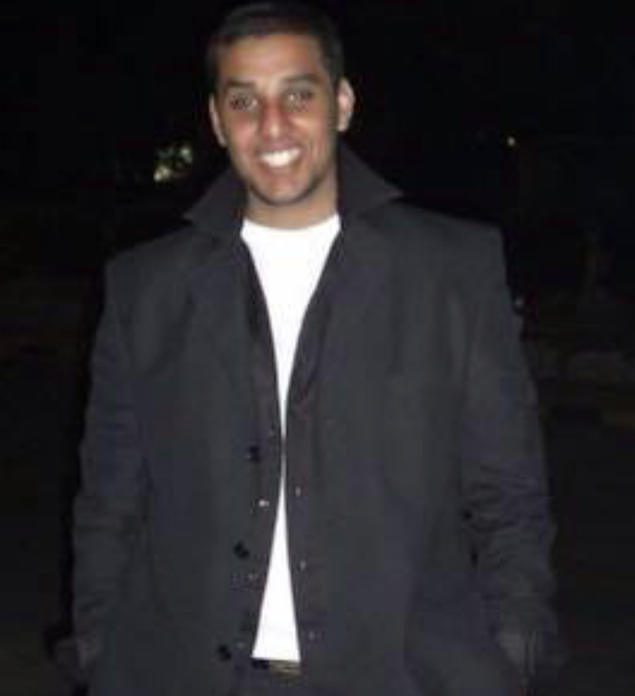Egypt’s Regime Has Held An American Student For Four Years. He May Soon Know His Fate.
While the violent authoritarianism of Egypt’s president has complicated relations with Western allies, President Trump has developed a close bond with him.
Egyptian military officers arrested Ahmed Etwiy on Aug. 17, 2013, during a security operation targeting political protesters, according to his family and American attorney Praveen Madhiraju. Authorities held him at a military facility and then a massive prison complex for over three years before a trial began. Etwiy was not even involved in the protests, his defenders maintain. Then a 23-year-old student at the German University in Cairo, he was in the area to escort his grandfather to a bus depot.
But the events of that summer in 2013, when the army aligned with street movements to overthrow Egypt’s first democratically-elected president, and the policies of general-turned-president Abdel Fattah Al Sisi since have embroiled thousands of innocent people, leaving international watchdogs, activists, experts and officials with little hope of progress or accountability. Earlier this month, Italy returned its ambassador to Cairo following more than a year of controversy over the Sisi government’s suspected role in the murder of an Italian student there, and Human Rights Watch released a major reportarguing that Sisi has greenlit torture and impunity for state security services ― prompting Egypt to block its website.
At least 20 Americans are presently behind bars in Egypt. Only two others have been named by their families and representatives: 52-year-old Mustafa Kassem, who like Etwiy was targeted in the summer of 2013, and Ahmed Hassan, who was arrested at the end of 2016 and turned 18 in jail this past May.
The Trump administration says it recognizes its responsibility to detained Americans abroad and has already tried to punish Egypt for its human rights problems by cutting some aid. In an email to HuffPost on Friday, a State Department official acknowledged Etwiy’s plight ― something the administration has previously not done publicly.
“We can confirm that U.S. citizen Ahmed Etwiy was arrested in Egypt in August 2013 on charges related to his actions during a protest. The trial of Mr. Etwiy is ongoing and a verdict is expected this month,” the official wrote. “The Department of State takes seriously its obligation to assist U.S. citizens abroad; we are providing appropriate consular services and will continue to monitor his case. Consular officers from the U.S. Embassy in Cairo have visited Mr. Etwiy regularly. Consular officers have also regularly attended trial hearings. We are providing all possible consular assistance.”
Trump did personally intervene with Sisi ― a world leader with whom he has developed a particularly strong rapport ― over another detained American this past spring. That woman, Aya Hijazi, was released weeks later. But Etwiy’s family and lawyer have told HuffPost they have had no contact with the White House, and representatives for Kassem and Hassan have previously said the same.
“We first reached out to the White House in March, and we’ve tried in several cases, both myself and the families. We haven’t heard anything directly,” Madhiraju, the attorney involved in all three cases, said. “The responsibility is really with President Trump: the law says the president must demand the release of Americans unjustly detained abroad.”


Ahmed Etwiy of New York is shown in an undated photo provided by his mother.
Etwiy faces three possibilities in the coming days, he added: more delays in the trial, which he called “political tricks”; the unlikely prospect of the judge exercising independence and releasing the young American because of the way the Egyptian authorities have handled him; or being pronounced guilty of crimes like murder ― and potentially facing the punishment.
One of his 494 co-defendants is Ibrahim Halawa, an Irishman who was arrested the same day and was then 17. Irish authorities have been more vocal than those of the U.S., which counts Egypt as a top security partner, and and Irish lawmakers claim Sisi personally assured them Halawa will be pardoned once the trial ends. ”It’s normal to be cursed, stripped naked, beaten with a bar, or put in solitary confinement or the “tank” (a pitch-black 3.5m x 5.5m cell),” Halawa has written. “They might also torture another prisoner in front of you. Of course you never forget. Ever.”
The State Department declined to address whether Trump has received any similar government promise regarding Etwiy.
Etwiy’s family just wants him back.
“Ahmed has a dream of pursuing a career in economics. He had one year left to graduation before he was unjustly detained,” his mother, Nagwa El Kordy, wrote in an email this week. “Ahmed is so kind to me, as a mother I wish nothing from him more than he already does for me. He constantly drives me around town, never letting me run any errands alone. He always has the tendency to free his time to take me to my doctors’ appointments and wait for me until I’m done. As a mother, I miss having my son being there for me, I miss his kindness, his courtesy, the decency and delicacy he shows, and overall I miss his gentleness.”


NAGWA EL KORDY
A memento Nagwa El Kordy keeps to remember her imprisoned son.
Etwiy spent his early days in prison worrying about his parents’ reaction and the stress he would cause them by not completing his education, according to a witness to his arrest and the early part of his detention who requested anonymity because of fear of reprisal from the Egyptian government.
“We started attempts to get his college to accommodate him…that was layers of disappointment over and above the general situation,” the witness said. He recalled tactics he and others developed to survive in the military camp where he and Etwiy were first taken, like sleeping in shifts because the cells were too small for all the detainees to lie down at once. Once they were moved to the prison where Etwiy remains, Wadi Natrun, they faced new challenges, like insect-infested cells, the denial of medical treatment and random beatings.
As the Egyptian government decides whether to let the young American leave those conditions, many in Washington will be watching closely.
Last month, Sen. John McCain (R-Ariz.), chairman of the powerful Senate Armed Services Committee, wrote Trump a letter specifically highlighting Etwiy’s plight.
“Etwiy and all of our citizens are looking to you for support and relief,” the senator wrote. “The United States remains committed to our partnership with Egypt, as reflected by Congress annually allocating $1.3 billion in U.S. assistance to Egypt. However, U.S. engagement should be coupled with an Egyptian commitment to human rights and democratic reform that will create accountable, democratic institutions and a dynamic civil society that can give all Egyptian citizens a stake in their nation’s future.”
Source: HuffPost Politics


